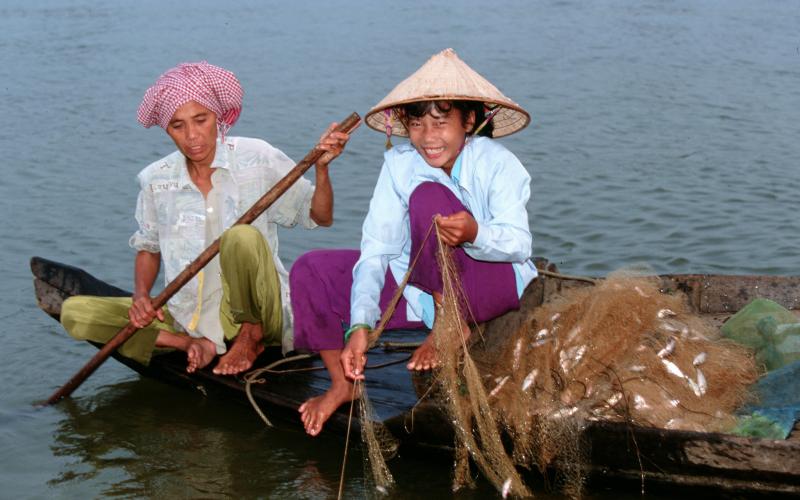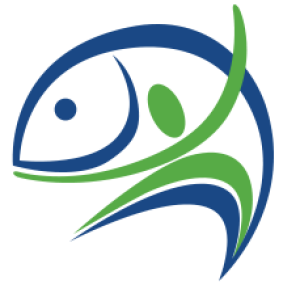
FISH provided new and compelling evidence on the critical role of fish and other aquatic foods in improving food and nutrition security, reducing poverty and enhancing environmental sustainability through its five years of research and innovations.
PENANG, December 15, 2021 –The CGIAR Research Program on Fish Agri-Food Systems (FISH) came to a close today after five years of providing evidence to improve food and nutrition security, reduce poverty, enhance sustainability, build resilience to climate change and develop a new foundation of research and innovations for fish agri-food systems.
FISH, launched in 2017, was led by WorldFish together with its managing partners, the International Water Management Institute (IWMI), the Aquaculture and Fisheries Group at Wageningen University and Research (WUR), the Australian Research Council Centre of Excellence in Coral Reef Studies at James Cook University (JCU) and the Natural Resources Institute at University of Greenwich (NRI).
FISH was designed to identify innovative solutions to contemporary food and nutrition challenges and contribute to more sustainable and resilient fish agri-food systems. To this end, FISH developed and adopted a Theory of Change and an integrated approach that addressed challenges for developing and managing sustainable aquaculture and small-scale fisheries in inland and coastal waters, with cross-cutting themes of nutrition, gender, youth, capacity development, climate change and, as later emerged, COVID-19.
Research was undertaken from community to global levels with multiple partners and investment from a blend of CGIAR and bilateral projects spanning 20 countries in Africa, Asia and the Pacific. FISH focused in depth on seven countries, namely Egypt, Nigeria, Zambia, Bangladesh, Cambodia, Myanmar and Solomon Islands. New knowledge and innovations were shared widely within countries and beyond through extensive networks and investments in capacity to influence policy, stimulate investment and generate broader impact.
FISH Independent Steering Committee Chair and former WorldFish Director General Dr. Nigel Preston said:
“In five years of oversight of the FISH CRP, the Independent Steering Committee members have been hugely impressed with the progressive delivery of outstanding research advances and impacts achieved by the program. Of most critical importance, the dedication of all of the FISH participants, coupled with the support of multiple donors and WorldFish as the host organization, has helped improve income, empowerment and nutrition for hundreds of thousands of individuals in low-income countries. FISH has also had a profound impact on raising global awareness of the critical nutritional and income roles of fish and other aquatic foods, laying the foundation for future transformative research to elevate the role of aquatic foods in reshaping global food systems for human and planetary health."
FISH’s research and innovation can be encapsulated in the following seven key areas; gender transformative approaches to address root causes of gender inequality, sustainable aquaculture growth through better management practices, faster-growing and more resilient tilapia and carp, nutrition-sensitive approaches to fish agri-food systems transformation, digital tools for decision making and investment in fish agri-food systems, re-integrating fish into multi-functional rice landscapes and new generation co-management approaches.
FISH researchers reported over 100 innovations between 2017 and 2021, underpinned by over 700 peer-reviewed publications, briefs, manuals, reports and other documents, tailored to a diverse user group, providing a unique and important insight into fish agri-food systems. A total of 310 peer-reviewed ISI journal articles were published during FISH, of which around 70 percent were open access and 16 with Altmetric Attention Scores greater than 100. The highest Altmetric score of 820 was achieved by a Nature article entitled Harnessing global fisheries to tackle micronutrient deficiencies, which quantifies the potential of fisheries to address malnutrition.
FISH Independent Steering Committee Member Dr. Cristina Rumbaitis del Rio said:
“I believe WorldFish truly had a disproportionate impact with its work under the cross-cutting CGIAR Research Programme for Fish Agri-food Systems -- ranging from the development of faster-growing tilapia and carp, identification of traits that confer greater climate resilience in tilapia, improved health and feed management, including rapid diagnostics to reduce disease risks, a deeper understanding of how to support more inclusive, gender-sensitive and women-targeted business in the aquatic foods sector, more inclusive and integrated management of small scale fisheries. This work has the critical evidence base for the role of aquatic foods in delivering health, nutrition, inclusion and sustainability outcomes globally, setting the foundation for scaling up innovations identified through the research program to solve contemporary food, nutrition and sustainability challenges affecting billions of people worldwide.”
New and compelling evidence was provided on the critical role fish and other aquatic foods play in nutritious diets and the diverse values fish agri-food systems bring to sustainable livelihoods and responses to the global climate crisis. FISH championed the more significant and central role that fish and other aquatic foods can and must play in securing sustainable, healthy and resilient food systems of the future. Concurrently, FISH helped position small-scale fishers, fish farmers and value chain actors, their wellbeing and the goods and services they provide as central to sustainable and inclusive food system transformation and building forward better post-COVID-19.
FISH researchers and partners also contributed to an influential UN Nutrition Discussion Paper and the UN Food System Summit and related policy processes that have led to increased recognition at the highest levels of fish and aquatic foods and the small-scale actors that steward fish agri-food systems.
WorldFish Director General and CGIAR Senior Director of Aquatic Food Systems Dr. Gareth Johnstone said:
“The research and innovations from FISH will have a long-lasting impact on the millions of people who depend on fish in the developing world. The body of evidence produced elevates the importance of aquatic foods even higher in their ability to offer triple wins for nature, people and planet, and will provide WorldFish with a vital springboard to achieving our 2030 Research and Innovation Strategy in the years to come. I applaud the achievements of the FISH team and thank them for their industry during the five years the FISH research program was in operation. These outcomes would not have been possible without the support of our generous donors and valuable partners, and I humbly extend my gratitude to them.”
Several areas of innovation that show substantial promise for further development and application beyond the timeframe of FISH were also identified. These include the newly emerging genetic map of GIFT that promise better performance under a changing climate, including tolerance of low dissolved oxygen conditions, resistance to tilapia lake virus and improved feed efficiency, FishNutrients -- a predictive model database of the nutrient composition of over 5000 fish species integrated into FishBase, the comprehensive methodological and practice innovations around gender and inclusion such as gender transformative approaches, among others.
FISH Director and Management Committee Chair Dr. Michael Phillips said:
“It has been a great privilege for me to lead the FISH research program, and I take the opportunity here to thank all research leaders and their teams, our partners and donors for contributing to a successful outcome. I believe this 5-year collaborative program has achieved much, but importantly has laid a vital foundation of knowledge and innovations that hold great promise for the future of fish and aquatic foods and their contribution to a sustainable and healthy food system.”
Read the synthesis report to learn more about FISH’s innovations in improving food and nutrition security, reducing poverty, enhancing sustainability, building resilience to climate change and developing a new foundation of research and innovations for fish agri-food systems.
###
NOTES TO EDITOR
Visit the WorldFish website for more information:
https://www.worldfishcenter.org/
Photography:
https://www.flickr.com/photos/theworldfishcenter/
Press contact:
For more information or to request an interview:
Tana Lala-Pritchard
WorldFish Executive Director of Strategy, Innovation and Communications
Email: T.Lala-Pritchard@cgiar.org
and
Sean Lee Kuan Shern
WorldFish Science Communications Specialist
Email: K.Lee@cgiar.org
About WorldFish
WorldFish is an international, nonprofit research and innovation institution that creates, advances, and translates aquatic food systems science into scalable solutions. We vision an inclusive world of healthy, well-nourished people and a sustainable blue planet, now and in the future. Our mission is to end hunger and advance progress on the 2030 Sustainable Development Goals through science and innovation to transform food, land, and water systems with aquatic foods for healthier people and the planet.
For over 45 years, WorldFish's data, evidence, and insights have shaped practices, policies, and investments to end hunger and advance sustainable development in low- and middle-income countries. We have a global presence across 20 countries in Asia, Africa, and the Pacific, with 460 staff of 30 nationalities deployed where the most significant sustainable development challenges can be addressed through holistic aquatic food systems solutions. Embedded in local, national, and international partnerships, our work sets agendas, builds capacities, and supports decision-making for climate action, food and nutrition security, sustainable fisheries and aquaculture, blue economy, One Health, and AgriTech, integrating gender, youth, and social inclusion.
A core element of the 2030 WorldFish Research and Innovation Strategy: Aquatic Foods for Healthy People and Planet is focused on building the resilience of aquatic food systems to shocks, which is critical to COVID-19 response and recovery.
WorldFish is part of CGIAR, the world's largest agricultural research and innovation network.
For more information, please visit https://www.worldfishcenter.org.
About FISH
The CGIAR Research Program on Fish Agri-Food Systems (FISH) is a multidisciplinary research program.
Designed in collaboration with research partners, beneficiaries and stakeholders, FISH develops and implements research innovations that optimize the individual and joint contributions of aquaculture and small-scale fisheries to reducing poverty, improving food and nutrition security and sustaining the underlying natural resources and ecosystems services upon which both depend.
The program is led by WorldFish, a member of the CGIAR Consortium. CGIAR is a global research partnership for a food secure future.
For more information, please visit https://fish.cgiar.org.
About CGIAR
CGIAR is the world’s largest global agricultural innovation network. We provide evidence to policy makers, innovation to partners, and new tools to harness the economic, environmental and nutritional power of agriculture.
CGIAR has a wealth of experience and knowledge spanning 50 years that builds on a track-record of innovation and world-class research. Thanks to our funders, CGIAR research has transformed the lives of hundreds of millions of people through tangible research outcomes.
The 15 CGIAR Research Centers are independent, non-profit research organizations, conducting innovative research. Home to more than 8,000 scientists, researchers, technicians, and staff, CGIAR research works to create a better future for the world’s poor. Each Center has its own charter, board of trustees, director general, and staff. CGIAR Research Centers are responsible for hands-on research programs and operations guided by policies and research directions set by the System Management Board.
For more information, please visit https://www.cgiar.org.
